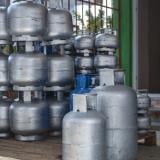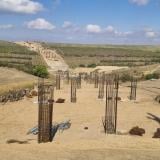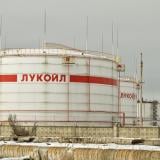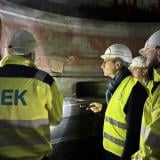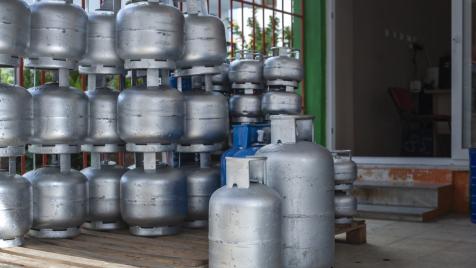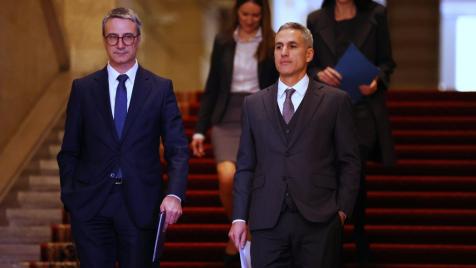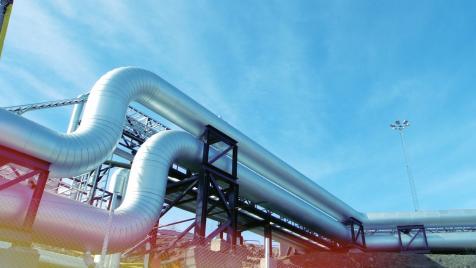Bulgaria is in need of reliable and clean coal-based production
We at AES consider our presence as a key one to help the country during its transition to a clean energy
Olivier Marquette:

© ECONOMIC.BG / Economy Magazine
Olivier Marquette assumed the responsibilities of a President of the business of AES in Bulgaria in January 2015 and is also President of the American Chamber of Commerce in Bulgaria. Preceding his relocation to Bulgaria, Olivier Marquette has been a Manager Business Development for AES in the United States, Director Business Development for AES Singapore and VP Business Development for AES Brazil and Dominican Republic. Mr. Marquette has graduated from “Ecole Nationale Supérieure des Mines de Paris”- Paris, France. He has a Master’s degree in Mechanical Engineering at Texas A&M University- USA, and an MBA from Harvard Business School. Mr. Marquette speaks French, English and Spanish and has a working proficiency in Portuguese and Bulgarian
Mr. Marquette, The AES Corporation announced in February 2020 a goal to reduce its coal fired generation to 30 % of its total generation by the end of 2020, and to less than 10% by by the end of 2030 as a result of its stated renewable growth plans. Will this decision impact AES operations in Bulgaria?
A macro trend in power generation is the decarbonization of the energy mix, which is driven by an urgent need to combat climate change and reduce worldwide emissions of CO2. This trend is widely supported not only by citizens, but also investors and lending institutions. In this context, AES mission is to accelerate the future of energy by offering innovative cutting-edge solutions that meet the needs of the particular markets we are serving. Every market has its specificities, and the path to decarbonization depends on local market conditions. Bulgaria has demonstrated its potential for renewable energy, and became the second Member State in the whole European Union to reach its 2020 renewable target.
At the same time the country produces between 40 to 60% of the needed energy in coal-fired power plants. This doesn’t contradict the general idea and the path that the country should follow but this should be done with a clear vision about the needed time for the substitution of these base load suppliers. At the moment thermal powerplants are the backbone of the energy system since they contribute to energy security, grid stability, and energy independence, in addition to providing jobs to tens of thousands of energy professionals across the country. The need of the operation of these plants have been explained in numerous statements of the Energy Minister Mrs. Temenuzhka Petkova. In her statements she explained that the realistic horizon for the substitution of these plants is 2050. I fully agree with her position. The coal should not be considered as an obstacle for the development of the energy of the future but as a tool that could make this transition smoother, guaranteeing that the lights will be on.
I believe that AES Galabovo is a good example of how coal plants can support the transition to green energy. We are the newest and the most modern plant in Bulgaria and we provide the most attractive set of technical characteristics to support the stability of the grid, namely lower minimal load, faster ramping rates (both up and down), and higher efficiency comparing with other plants. Haven said this, I think that Bulgaria is in a good position to continue developing a greener energy sector having the comfort to use modern and reliable thermal plants to pave the way to this new future.
TPP AES Galabovo has been criticized that its PPA is among the reasons for the increase of the overall energy price in Bulgaria which affects the business and households. How would you respond to this criticism?
I cannot agree with such statements. The price of electricity generated by AES Galabovo is fully consistent with other plants of similar technology and age. In addition, the PPA was necessary to ensure that AES Galabovo project receives the necessary financing from European banks in order to get built. The PPA is also what ensures the predictability and sustainability of the operations of the plant, thereby providing a steady stream of revenues to its coal supplier MMI, and all its contractors.
And here - let’s analyze the prices of different plants. If you look in a depth, you will realize that the prices of AES Galabovo are comparable to the ones of the other producers. And this is having in mind that AES Galabovo is the newest plant in the country and the only one built during the last 40 years. We have made a total investment of EUR 1,3 billion in the plant and because of the very modern and advanced technology, and the good management of the company costs we manage to provide safe and reliable energy at prices that are completely consistent with the price of other market participants in Bulgaria, and plants of similar technology across other markets.
Talking about the energy system, the dialog should not focus on the price only as it is only one part of the equation. The other ones are the reliability of the facility, its ability to respond to the balancing needs of the system, the environmental performance. Considering all these benefits, AES Galabovo plays a critical role in the stability of the electricity system in Bulgaria.
At what stage of the repayment of the investments is the power plant?
The investment model of the plant was built based on 15 years of repayment of the investment. At the moment we are up to start our 9th year of operations and the plant is still in the process of repaying its investment, both to its European Lenders, and to its equity investors.
Form the very beginning we are working with the highest possible operational standards to guarantee not only the security of supply but also to complete our obligations toward the reputable international financial institutions that believed in the sustainability of our project and financed it.
The European Union adopted the Green Deal, according to which by 2030 the use of coal should be phased-out. Do you think that this decision is right for Europe and in particular for Bulgaria, having in mind our enormous dependence on coal-fired energy? Bulgaria has not yet defended a specific position to preserve these capacities. How would Bulgaria deal with this problem with so little time left?
The European Green Deal marks a watershed moment in European Union energy and climate policy and AES welcomes its publication, as well as the ambition for Europe to become the world’s first climate-neutral economy by 2050. The proposal to set the net-zero greenhouse gas emissions by 2050 into law will provide regulatory certainty to industry on Europe’s decarbonization trajectory.
But given a number of uncertainties (economic, political) in some Member States, it is important that any revision of EU energy and climate targets ensures flexibility on their journey towards achieving them.
In addition, legislation to achieve the climate neutrality target for 2050 and any revisions to the 2030 targets must account for regional diversity in the capacity to decarbonize.
Bulgarian government already expressed it vision and gave a clear message that the implementation of the new policies should be aligned with the particularities of the national energy system which relies on conventional capacity in order to secure energy supply. This statement embraces the national interests and reflects the fact that there has been a significant increase in renewable energy production, which constitutes around 19% of final gross energy consumption.
The pace of Bulgaria’s decarbonization depends on the current contribution of coal generation in Bulgaria, which is quite high compared to other Member States. As such, it is important that EU rules consider this national context – particularly in relation to any readjustment of greenhouse gas emissions reduction targets and renewable energy targets for 2030.
Bulgaria is still in need of a portion of reliable and clean coal-based production (with a high ramp-up and ramp-down flexibility) – considering that other technologies do not provide a sufficiently large amount of flexibility needed – at the very least, on standby in case of power shortages and in order to compensate for the low reliability of renewable energy.
We, at AES, consider our presence in Bulgaria as a key one to help the country during its transition to a clean energy in line with the recently announced “Green Deal” objectives.
Through AES Galabovo and St Nikola wind farm, AES contributes to energy transition by safeguarding security of supply, ensuring reliability in periods when renewable generation is insufficient in Bulgaria, and helping the Bulgarian energy market become fully liberalized and regionally integrated.
AES’ St Nikola wind farm, near Kavarna on the Black Sea coast, has saved Bulgaria 28.5% more CO₂ emissions in 2019 compared to 2018. Saint Nikola is the largest wind farm in Bulgaria, with 52 turbines of 3MW each – and in 2019 it generated 291 GW hours (GWh) of power, thus significantly contributing to the country’s renewable electricity production and playing an indispensable role in Bulgaria achieving its renewables targets.
You are a representative of a global company operating in 14 countries. What other nations do to guarantee the sustainability of their systems and to make them greener?
AES has a unique experience because we operate all around the globe and this gives us a wide view on the development of the energy sector. We are partner of choice of many countries because of our ability to offer solutions that are able to satisfy the current and future energy needs of the customers.
A very interesting and innovative project that I would like to mention first is the Lāwa’i Solarand Energy StorageProject on Kauaʻi's south shore. This project in Hawai’i, that we developed together with Kauaʻi Island Utility Cooperative consists of 28 megawatt (MW) solar photovoltaic (PV) and a 100 MWh five-hour duration energy storage system. This unique facility contributes significantly to the State of Hawai’i’s goal of reaching 100 percent renewable energy by 2045. The project provides 11 percent of Kauaʻi’s electric generation; increasing KIUC’s renewable sourced generation to close to 60 percent.
This system provides dispatchable renewable solar energy with the ability to deliver consistent peak power output for up to five hours outside of daytime hours while preserving the ability to provide energy directly to the grid during daytime hours.
The world is becoming more and more digital. How digitalization affects the development of the energy system?
Digital technologies are the ones that are shaping everything around us, and the energy sector is not an exclusion. I fully agree with Satya Nadella, CEO of Microsoft who said that now every company is a digital company. No matter what kind of business we are developing, digitalization is the element that helps us to further the operations.
Four months ago, AES announced its 10-year strategic alliance with Google to accelerate the growth and adoption of clean energy by leveraging Google Cloud technology to pioneer innovation in the sector. This alliance builds on the recent agreement between Google and AES to provide long-term renewable power to Google’s data center in Chile.
The two companies will work together to improve the experience for corporate energy customers and to develop and implement solutions that enable broad adoption of clean energy. AES will collaborate with Google Cloud on energy management and opportunities to sponsor clean energy projects in targeted markets that have the potential to help Google meet its clean energy objectives.
As part of this alliance, AES will use Google Cloud technology to help create the grid of the future and improve the experience for energy customers. AES innovation partner, Uplight, will also utilize Google Cloud technology to enhance its end-to-end energy action system, to increase customer satisfaction and reduce carbon emissions. Google Cloud’s leading platform, tools and cutting-edge technology will help redefine and improve AES and Uplight’s delivery of customer solutions through advanced cloud computing, data analytics, machine learning (ML) and artificial intelligence (AI).
As a journalist today I have a chance to make an interview with two managers at the same time. Could you please get out of your role of president of AES Bulgaria and put on the hat of the President of AmCham. How would you assess the development of the business relations between Bulgaria and the USA?
I think it is not needed to present my self once more (smiles). So, in my role of a president of AmCham I think that the business relations between the two countries are developing quite positively. We see that the active dialogue between the administrations of both countries resulted in significant benefits for the local economy. One of them is the significant modernization of the equipment of the Bulgarian army which became possible because of the deal for the new planes.
We also see an active dialogue in the field of energy and the plans for the further modernization of the energy system of Bulgaria based on LNG. This is a great opportunity to use new sources of energy that will help the country to maintain its leadership position in the region.
I think a very important part of this cooperation, for which we don’t talk enough, is the scientific exchange. The education is the base for the development of every single field of the national economy. We see that a lot of young talented Bulgarians are entering US Universities and receive world-class education that will make them the leaders of tomorrow, shaping the future of the economy armed with their serious scientific background.
You have already been in Bulgaria for several years. Does our state make any progress with the reforms? How would you assess the business climate in Bulgaria? What are the main problems for the business here?
The business climate is Bulgaria is improving. We see that the reforms of the legislative framework are enhancing the chances to do business here. Bulgaria has unique advantages – a EU member, with strategic geographic position and great experts that could develop the local business.
I see a lot of companies being interested in investing in Bulgaria. To maintain this interest the business climate should continue developing and giving the confidence that the investments in Bulgaria are well protected both the constant economic reforms and the stable perspectives for business development. What investors are valuing the most is the predictability, the awareness that the sacristy of the contracts is strictly protected.



